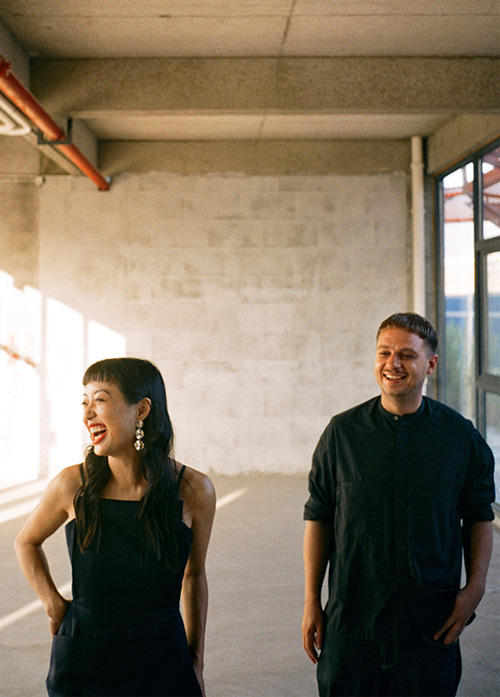
NEW WAVE CREATORS: FFIXXED STUDIOS
Redefining modern Chinese aesthetics through fashion
Words and photography by Bohan Qiu / Editorial assistant Raja Chin
Fiona Lau and Kain Picken, the designer duo behind FFIXXED STUDIOS, have never been conformists. Over the past decade, the Australian couple has lived in Berlin, New York, Melbourne, Hong Kong SAR and Shenzhen.
Originally from Melbourne, they started their creative careers in Berlin, where Fiona interned at BLESS (one of the city’s most cutting-edge fashion and lifestyle stores) and Kain co-ran an artist studio. There, they began FFIXXED as a passion project, where they used materials and ideas embedded within fashion to create sculptural works. A stint in New York followed, and a trip to Hong Kong SAR for factory research inspired them to treat their passion project more seriously. They haven't looked back since.
After landing in Asia, they soon discovered that neighbouring Shenzhen had an even more direct connection with suppliers and factories. With that realisation, after a year they moved their studio to the Wutong Mountain area of Shenzhen, hidden within a local village far from the centre of the city. They created their own little utopia, along with a unique business model that was new to their world. This move not only benefitted the daring design duo, but in turn, helped to nurture a local independent mindset in their fellow Shenzhen-based creatives.
But recently, after six years in their private paradise, they decided to move their entire studio to Shanghai. We spoke to them about their journey.
Why did you decide to move to Shanghai?
Kain: We spent our longest time since leaving Australia in Shenzhen. But it started to become apparent that everything is now centralised in Shanghai, and the company and the brand would benefit. Also, we needed a change of pace and atmosphere.
Fiona: And it’s really fun here!
How did the other cities you’ve lived in such as Berlin and Hong Kong SAR influence you?
Fiona: Berlin was really formative. Then the year in Hong Kong SAR was quite hard for us. We were just starting to build our brand, and we had to work side jobs teaching English to survive.
Kain: It was a hard year, but it also made us realise we didn't want to work on anything else but to focus on the brand.
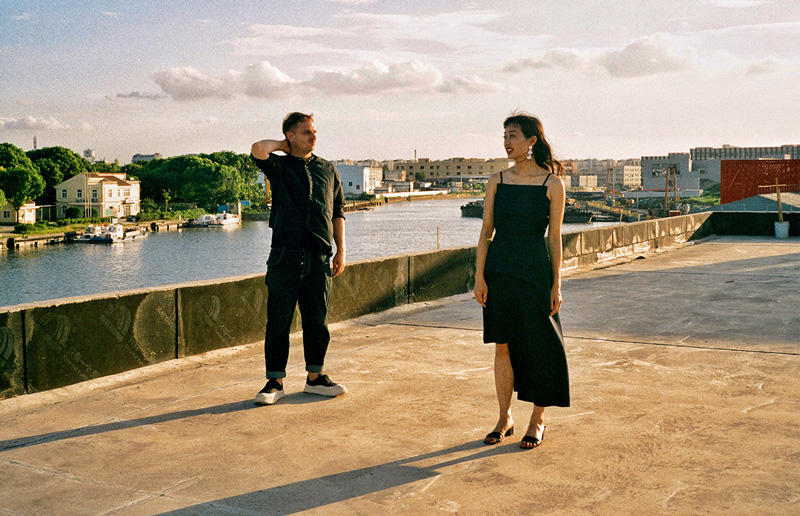
FFIXXED Studios has been known for its ethical production since you started, and you’re continuing to release upcycled pieces. How has this concept evolved over time?
Fiona: It was something ingrained in our idea of how things should work, and we weren't even thinking about it so much. We wanted to control our sourcing and make sure our production was all done ethically and sustainably.
Kain: But over the years, factories have also adapted too. Nowadays, there are many geared to work with young designers, so they’re much more open and transparent. It's not the same old-school mass-production model anymore in China, where conscious practices weren’t part of the landscape.
A lot of people think you’re a Chinese brand as you fit into this ecosystem, but at the same time not considering neither of you is Chinese, and that you’ve been based in different cities as well. What’s your take on this identity?
Fiona: We definitely identify with being a Chinese brand. FFIXXED is part of Shanghai Fashion Week, and we've just been picked for Pitti Uomo’s Guest Nation China. Also, we’re very inspired by our daily life, and since we live here, our collections are definitely influenced by it.
Kain: Funnily enough, when we first started, people would ask us if we were an Australian brand or something else. We said it didn’t matter at the beginning and that we had no fixed location. It was a nice idea at the time, but there is something vital about being attached to a community. For us, that community is in China. It’s never been an issue for me being ethnically not Chinese, but working in China.
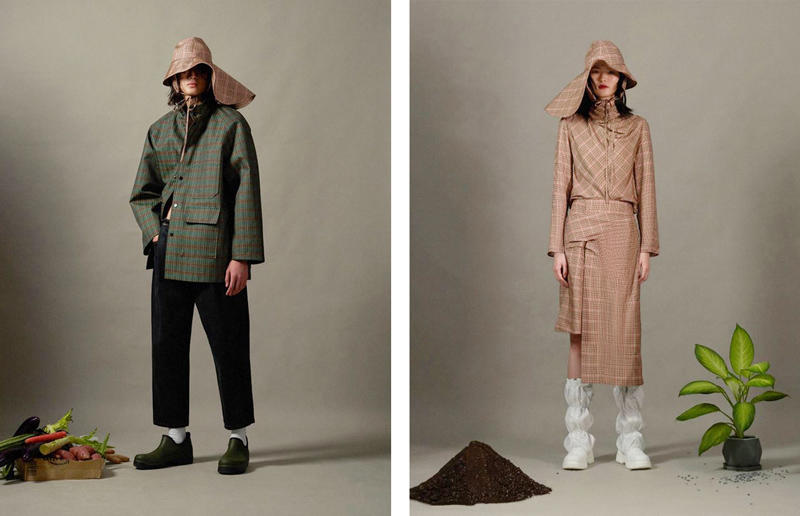
Does that have to do with the community of designers in China?
Fiona: The community here is very supportive and very inspiring. There are so many young and creative people, and everyone is very generous with contacts.
Kain: There’s a much more conscious focus on people here. People are very aware that we need to build an ecosystem. There’s the mentality that if we want this thing to fulfil its potential, everybody has to work together. It's quite possible in China, but not really in the rest of the world.
With the driving force of Chinese creative incubator Labelhood and key retailers like Lane Crawford, Chinese designers have proliferated not only locally but in the global arena as well. How is this ecosystem supporting or helping newcomers?
Fiona: Labelhood invited us to give talks to fashion students and act as mentors for them, helping them to prepare for job interviews and collections, and creating their own brands.
Kain: And we were honoured to have been selected as judges for Lane Crawford’s Creative Call Out programme, which helps support new creative talent from the region.
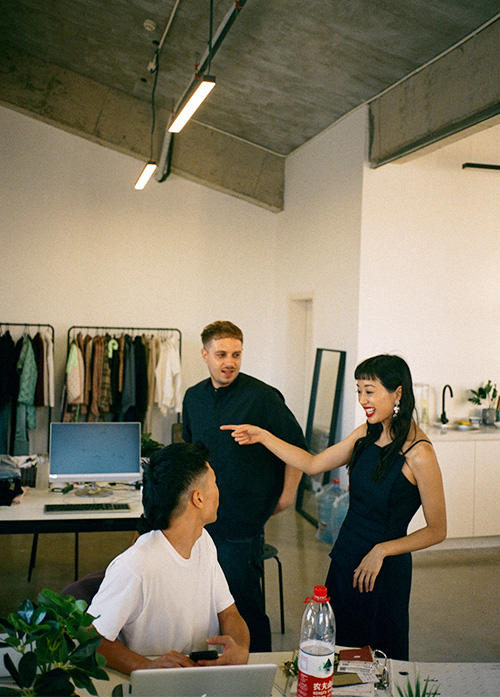
Now you’re close to celebrating your 10th birthday, do you feel like you’ve become established as a brand? What's next?
Fiona: I think there’s still lots of room to grow. We've been growing very organically, and we want to take it at our own pace. But as we’ve aged 10 years as well, we’ve transitioned ourselves personally too.
Kain: When we were in our early 20s, we just wanted to wear fun crazy stuff, but now we also just want to wear more wearable things that are still interesting. Working with Lane Crawford we get different customer feedback, which also helps us a lot.
Fiona: Our customers are also ageing with us, so now they maybe have kids or have more serious jobs, so the demand is also changing. We’re also so inspired by daily life — when we lived at Wutong Mountain in Shenzhen, our aesthetics were definitely different then to now when we live in Shanghai. Life is also very different here. People would wear whatever in the village, but now we think more about city life.
"Enhanced Daily Essentials" was a key concept for FFIXXED. Is that still the case?
Kain: Of course, that’s still the underlying foundation.
Fiona: We’re still combining small details and daily items that are quite interesting for us. We get a lot of people who can wear our clothes in different ways. Our customers could work in design or in a gallery and appreciate good design, or they can also be young kids who love fashion and would style our stuff in an exciting way. For our womenswear, our cuts and fit are usually not too sexy or too tight, so they’re able to fit a wider range of ages or styles.
Kain: It’s for people who are interested in fashion but don’t necessarily identify themselves as fashion people. Particularly in menswear, our customers want something a bit more elevated than Uniqlo or Zara, things that are still easy to wear every day but have an interesting twist. For example, one of our key items from last season was a denim town and country jacket. It was a denim jacket with an inbuilt blazer on the inside. It’s quite literal, but at the same time you can wear it, and it’ll look normal with a cool twist. There’s a playful element there, so it’s easy if you want to style it up or down, and it’s these small details that our customers really love.
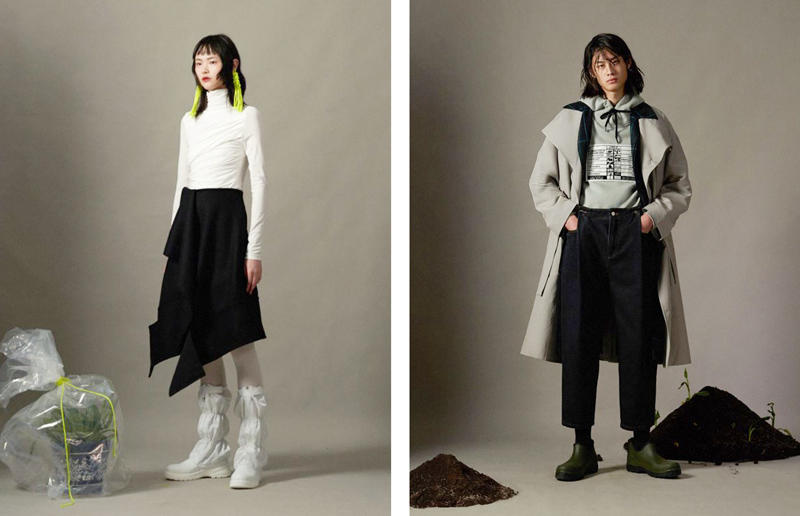
Japan was initially a big market for FFIXXED. How did that start, and is it different now as the Chinese market grows?
Fiona: We started out as a small and independent brand, and Japan picked it up quickly. It became our biggest market. In the beginning, our aesthetic was maybe more Japanese and experimental.
Kain: But at that time, the China market didn’t exist the way it does today. That was around the time when Ritchie Chan opened Triple-Major in Beijing, and Dongliang opened in Shanghai, and these first generations of independent, selective boutiques educated the market. The development of the China market has been incredible — it’s matured in only a matter of four to five years. Now the customers even in third- or fourth-tier cities have an understanding of independent design, and a huge demand for not just the luxury brands but also local independent designer brands. Fiona: In Europe, everyone is a lot more mature, and there’s the tradition that you have to work for a long time to get enough experience. But in China, everyone working in the industry is so young. There's the spirit of taking a risk.
Kain: People here feel like, “Now is the time.” You have to take a chance now, otherwise it’s too late. It’s also an incredible generational thing for young people in China. That makes it so energising to be here. In Shenzhen too, where there’s such an entrepreneurial feeling and there’s a lot of risk taking.
Where do you want FFIXXED to be in five to six years?
Fiona: I think we’d want to make it more sophisticated as we grow as well, so it’s still true to us.
Kain: I think we’d love to expand the product categories. One of our dreams is definitely to do a lifestyle range, but we’ll need a really strong foundation for it.
Fiona: But we do everything slowly, and we’re not in a rush. Many brands feel the pressure to do everything at once, but for us, we don’t want it to be something we can’t continue to do after investing a lot of time and energy.
Kain: We’ve had opportunities asking us to do a lifestyle range before under a big joint venture, but we refused because we want to do it at our own pace.
You guys were the stars of Lane Crawford’s Creative Call Out back in 2015 and later acted as judges as well. What advice would you give to creatives starting out these days?
Kain: I think you have to know what’s compelling about your stories. We noticed this when we were judges more than when we were contestants. You have so many people who have a great business plan and a vision, but the standouts are always those who have a better story to tell.
Fiona: There are so many brands that have good aesthetics, good manufacturing, but what else can you tell us about yourself? What’s your reason to exist or your point of difference?
Kain: One thing about the explosion of the Chinese fashion scene is that now we have a lot of brands, but not all of them have a story to tell. Everybody is young and following a similar trajectory.
Fiona: The kids in China are so savvy, and so many of them are starting out with such amazing collections, a great business plan and excellent stories. Sometimes we see them and even get inspired ourselves!
The hunt is on: Join us on September 6 at Lane Crawford Shanghai Times Square, where we’ll unveil Creative Call Out 2019! Stay for drinks and shop our latest pop-up with Labelhood.